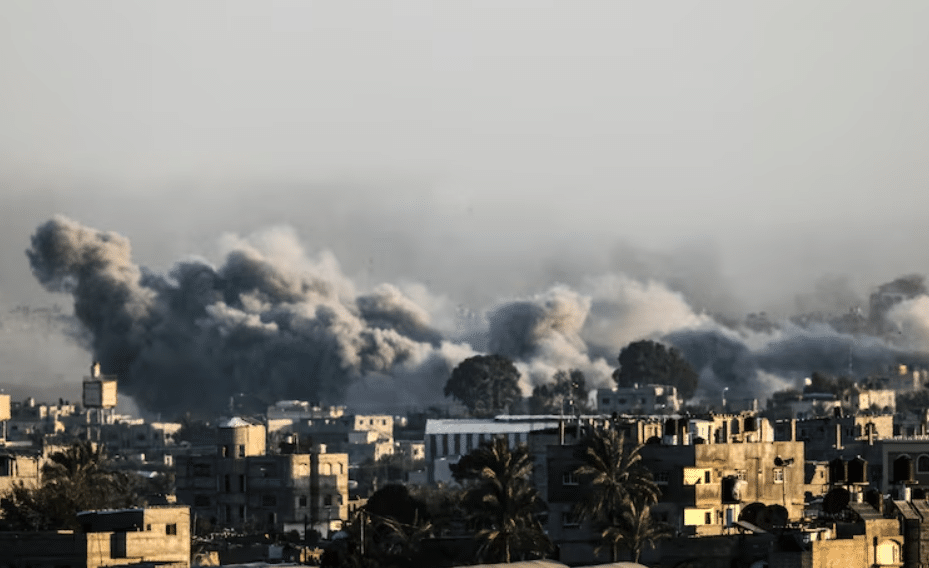Israel’s war against Hamas is seeding hate, and a two-state solution is needed, European Union foreign policy chief Josep Borrell said Monday amid escalating international pressure on Israel to work toward a long-term political road map to peace.
Commenting before a day of intense diplomacy in Brussels — where European foreign ministers are gathering alongside counterparts from Israel, the Palestinian Authority, Egypt, Saudi Arabia, Jordan and the Arab League — Borrell said he knows that Israel has “a different stand.”
[The Washington Post Report continues]
Israeli troops had stormed al-Khair Hospital in western Khan Younis and detained medical staff, the Gaza Health Ministry said. Ministry spokesman Ashraf al-Qudra called the health situation in Gaza “catastrophic and indescribable.” The Washington Post was unable to verify the report.
Israeli Prime Minister Benjamin Netanyahu, who has said he is proud of his historic efforts to block Palestinian statehood, has repeatedly rejected the idea. A Palestinian state is an “existential danger” to Israel, he reiterated Sunday, vowing to continue to oppose it as long as he is prime minister.
But the bloodshed of the Hamas attack on Oct. 7 and devastating pace of civilian casualties in Israel’s ensuing war have revived a push for a two-state solution. The notion of two states for two people is broadly supported in the international community, including by the United States and the United Nations.
“I think that we have to stop talking about the peace process and start talking more concretely about the two-state solution process,” Borrell said ahead of the meetings in Brussels, where he will present a 12-point plan to revitalize the Middle East peace process.
The plan “aims to address the conflict and occupation that preceded the Gaza war and that, if left unaddressed, must be expected to lead to further wars,” according to a copy obtained by The Washington Post.
“There is no credible comprehensive solution other than an independent Palestinian State living side by side with Israel, in peace and security, with full normalization and substantive development of security and economic cooperation between Israel, Palestine and the region,” it said. It called for the establishment of a “Preparatory Peace Conference” at “the earliest opportunity” to discuss a lasting solution.
Middle Eastern countries represented in Brussels on Monday have also been working on plans to end the conflict, with Saudi Arabia explicitly tying normalization of relations with Israel to a credible path to Palestinian statehood.
[The Washington Post Report continues]
“Only total victory will ensure the elimination of Hamas and the return of all our hostages,” Netanyahu said in a statement, adding that he had emphasized this position in a call with President Biden over the weekend.
War in Gaza is making childbirth a nightmare
On Sunday, Israeli Defense Minister Yoav Gallant told a meeting with the relatives of hostages that the operation in Khan Younis is “in full swing” and that “there are preliminary indications that we have reached the most sensitive Hamas locations,” he said.
[The Washington Post Report continues]
“This night could be one of the most difficult nights,” he said. “We barely escaped.”
During the early days of its assault on the Gaza Strip, the Israel Defense Forces demanded that residents move south into Khan Younis and Rafah for shelter. Khan Younis, once considered safe, now has some of the heaviest fighting, and Rafah is increasingly running out of resources as more and more displaced people stream in.
In another corner of Khan Younis, 31-year-old Muhammad al-Zarie, who was residing with his brothers in a tent near the city center, spoke of the ceaseless echoes of strikes and shelling resonating through the night and morning hours.
“We don’t know where we will go if they advance farther. Thousands of displaced people arrived in the morning, and there is no place for them in this camp,” he said. “The army instructed us to head to al-Mawasi, and we are here, but this area is no longer safe.”

